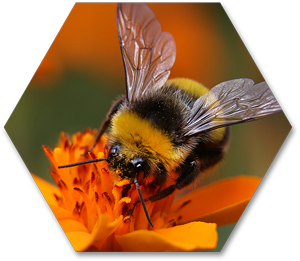Our Story
Bees are vital to the earth's ecosystem. Around 35% of global crop production needs pollination from bees to produce our fruits, vegetables, nuts, seeds and oils. It is widely assumed that without bees, we could not sustain our current population.
The challenges facing bees are complex and interrelated. Whether it's pollution, pesticides, parasites, or climate change, we should pay attention when bees start dying. Bees are the proverbial canary in the coal mine, alerting us that something is happening in theirs, and by extension, our environment.
At ecoWarriors NFT, we chose bees to be our mascots because they are emblematic of the delicate interplay of a host of environmental factors.
We believe that environmental concerns need to be considered from a holistic point of view.
Rarely is one negative ecological outcome a problem in isolation; rather, it is likely just the tip of the iceberg that catches our attention. Further research generally uncovers a host of underlying issues and adverse outcomes laying beneath the surface of our awareness.

ecoProjects We Support

We support projects that look at the totality of the environmental issue trying to be solved. Frequently, solutions only look at mitigating the symptoms instead of treating the real problem. That process generally upsets natural balances further, leading to unintended consequences that exacerbate the problem.
For example, one of the negative consequences of intensive animal farming is the accumulation of massive amounts of manure. When ruminants existed in migrating herds, their feces were spread out, and natural processes rendered them a beneficial fertilizer.
Manure management for a large dairy typically involves storing manure in lagoons where anaerobic bacteria generate high levels of methane, a very potent greenhouse gas. The tip of the iceberg, to continue our metaphor, is the odor that emanates from intensive livestock production. However, literally under the surface, other environmental impacts are occurring, such as groundwater contamination,
Making the Planet Healthy
Through our NFT sales, ecoWarriors are pleased to support several initiatives seeking holistic solutions, including a bacterial manure remediation process. This natural treatment, while eliminating odors and improving groundwater, reduces greenhouse gas emissions.
Bees are our mascots because, like us, they face many ecological challenges; however, each little warrior carries on, doing their part to make the world healthier. We encourage each of you to work with us in some small way to make the planet healthier too.

ecoToken Origin
For a long time now, we have questioned the overall approach to climate action. Change is needed, but as a society, we do not want to cause mass suffering while trying to prevent preventing mass suffering. Many fear the new "green revolution" will decimate our global economy and cause many a dark winter. To mitigate the damage such a large-scale transformation may cause, we must first implement an infrastructure that can manage it.
There has been so much focus on fossil fuels that often major environmental issues go unnoticed. Looking for a quick fix, governments seem to be more focused on shutting down businesses that have a negative impact instead of fostering companies that will produce positive outcomes.
Working with NOAH Water Technologies, we discovered that much good could be done with just a little bit of funding in the right areas. The lack of financial backing kept us from significant water treatment projects that could have had an enormous environmental impact. These projects included cleaning highly polluted and toxic lakes in India, contaminated drinking water sites in Canada, and providing cheap desalination worldwide.
Countries are talking about spending trillions of dollars on increasing solar and wind energy when a few million could have made a huge environmental impact if spread over several focused projects.
Every week, it seemed like the government funding we had lined up for a project was being pulled due to a change of staff, election cycle, or just slowed to a complete halt in the general bureaucracy. So naturally, this led to some frustrations at our existing funding solutions for environmental remediation.
A word from James
I am a major crypto enthusiast. Recently I have been in a thought process where I consider how things I regularly come into contact with could be improved in some way by blockchain technology. I truly believe that humanity's best path forward is through blockchain technology's freedom and decentralization.
Before I entered the blockchain world I was and still am fascinated by our macro economic outlook and current monetary system. Originally this path led me to become more of a gold and silver bug given our systems current trajectory. However, this began to shift as I became more familiar with blockchain technology. The original thought when first entering the blockchain world is that bitcoin performs a similar function to gold but with more divisibility and transferability.
Although this wasn’t enough for me. The idea of decentralized blockchain technologies is so much more than that. We are able to create an entirely new system for everything that we do in a decentralized and more efficient way, allowing everyone to participate in the creation of this new system. A system that is far more functional and equitable. For me blockchain technology is producing the infrastructure to a new financial system just as our old centralized system seems to be failing.
The ecoSystem aims to be that new infrastructure when it comes to solving climate issues. Centralized approaches do not factor in the unseen consequences of its actions and can leave devastation in their wake. Through the ecoSystem and a decentralized approach using free market principals the market (aka. The people) will decide what the priority is in terms of environmental remediation.
We have also added a “hard money” component to this system by having a hard capped supply with deflationary tokenomics so that holders can simply support the environment by holding a scarce asset. This system will use the existing carbon credit structure in unison with an internal carbon credit mechanism. We hope other projects will follow and create a world in which there is an abundance of private crowd sourced funding for environmental projects everywhere to succeed.
A word from Randy
I WAS IMMEDIATELY CAPTIVATED when I was introduced to the technology that became the foundation of NOAH Water technologies. It came at a time in my life when I was approaching retirement age and looking for a way to give back—what better way than treating water with a high-volume, low-cost solution that creates genuinely healthy water.
I believed that it would be immediately apparent to anyone looking at this technology. That proved true for the average person we talked to; however, it soon became evident that governments and other stakeholders had their own agendas—agendas that frequently made environmental impacts a secondary concern.
Along the way, we met a host of other innovators facing the same challenge. They had truly remarkable technologies but no clear path to bringing them to market. This was when I began to conceptualize the problem as a three-legged stool.
To bring new technology to market, you need to have three things happen concurrently: You need the right technology, you need adequate funding, and you need a customer. Far too often, innovators having spent their seed money developing their intellectual property to a working model discover that access to the market presents a financial barrier that is too high to scale.
As a result, typically, they look for government support to clear the final hurdle. However, after filing mountains of paperwork and jumping through bureaucratic hoops, optimism turns to despair as the rejection letters accumulate.
It wasn't until I was asked to submit a proposal for "Cleaning up" Lake Okeechobee that I began to see why the current approach to environmental issues was not working.
The pitch to me started in a familiar way, "Randy, the government has a ton of money for cleaning up Lake Okeechobee. Can your technology do it?"
In this case, the pitch was made by someone who didn't really care about the scope of the problem but was trying to skim a finder's fee off the top.
Nevertheless, I spent several months investigating the situation, looking at what had been done in the past and reflecting on why the efforts to date have largely made the situation.
As I contemplated the centralized approach to solving the problem, it became clear why large government-funded projects would never solve these types of environmental issues. The problem is too big and too complex for a single solution. Furthermore, restoring the ecosystem doesn't fit within a 4-year election cycle, which is why politicians favor grand, expensive ventures that inevitably make matters worse.
Spoiler alert! The money wasn't as readily available as I was promised.
However, the exercise proved valuable as it helped crystalize my thoughts on a decentralized approach to environmental initiatives.
I discovered that the solutions to restoring the Lake Okeechobee ecosystem already existed with the collective intelligentsia of the Universities in Florida; what was lacking was a framework to allow them to put their innovations to work.
When James had the idea of the ecoSystem I realized that it was similar to the concepts I had already formulated through my contemplations of the Lake Okeechobee problem.
As a newcomer to the world of Decentralized Finance, I was intrigued to find how well DeFi meshed with my musing on Decentralized Environmentalism.
A hundred thousand people lying on the pavement in a vain effort to shame the government to do something will inevitably fail. That's not the government's role. A hundred thousand people—each contributing something practical to solve problems in tangible ways —will make real, measurable change.
A Decentralized Approach to Environmental Initiatives
It was the desire to generate meaningful environmental impacts coupled with the frustration of working through the existing paradigm that the ecoToken System was born.
The ecoSystem is a launchpad for environmental remediation projects, a carbon credit exchange, and a place where anyone can easily offset their carbon emissions.
The ecoToken System solves four significant issues holding back environmental progress:
Funding, Centralization, Unnecessary Bureaucracy, and Economic Incentives.
The solution involves a positive feedback loop centered around the ecoToken.
There is a lot of innovative technology capable of solving real-world problems sitting idle because the necessary funding is not available to bring it to market. Typically, high upfront costs are needed to get a project up and running. Furthermore, it isn't easy to persuade financial institutions or investors to support projects when profits may take longer than expected to manifest. Through the ecoSystem, innovators can make their pitch for funding not simply based on the potential economic return of their technology but also the positive environmental impacts. Supporters can then choose to fund projects according to their personal objectives: weighing each project's economic, ecological, and social benefits.
Centralization adds layers of bureaucracy between planning, funding, and implementation of beneficial outcomes. While consuming a lot of money that could otherwise be devoted to environmental initiatives, the bureaucracy is subject to political interference, often prioritizing projects that may have lesser environmental value for ones that generate better talking points.
Through their internal inertia, centralized bureaucracies aren't adept at adjusting quickly to new challenges, reflecting local objectives, or solving multiple problems in diverse areas. The ecoToken Systems decentralized approach to environmental initiatives brings the environmentally conscious closer to those who can make the most significant impact in their area of concern. Furthermore, this direct support ensures these impacts happen on much shorter timeframes than a government bureaucracy can do.
A Decentralized Framework
Large-scale environmental challenges like Lake Okeechobee will still require government oversight to establish ecological standards; however, environmental initiatives should be given the freedom to work within the system once the regulatory criteria have been set. Similarly, a coordinating body will be required to prioritize and evaluate the overall campaign.
Still, it needs to be a body committed to the success of the project and a free from politics as possible. The ecoToken can facilitate this through its decentralized approach by funding many complementary projects that operate separately, with crowdfunding through the ecoSystem. The ecoSystem can address the diverse challenges facing Lake Okeechobee through funding several micro-projects, rather than the government approach of mega-projects doomed to exacerbate the problem.
The climate market is also plagued with bureaucracy and paperwork. We understand that sometimes it is necessary, but it can also hinder progress and disincentivize action. Therefore, the ecoSystem will be tokenizing both third-party verified carbon credits and internally verified credits. Let's face it one tonne of carbon reduced is valuable whether it has an expensive certification attached to it or not.
This two-tiered carbon market will enable large companies to meet government-mandated regulations you show certified offsets. It also allows average citizens to make equivalent environmental impacts at a lower price point. Of course, users will choose which credits they offset their emissions with, so supply and demand will dictate which credits will be more abundant.
The final problem we aim to solve is creating an economic incentive where anyone and everyone can be rewarded for funding environmental projects through the launchpad style approach. Projects looking for funding will be vetted on several criteria, but one of them will be on the anticipated revenue that they will return to the ecoSystem. The expected returns will be listed right on the website before funding. The returns will be distributed to users who stake or plant their ecoTokens to support the project with higher returns to those who plant.
Other returns to the ecoSystem will be through carbon and other environmental credits sold within the ecoSystem. All funds will be converted back into ecoTokens and distributed to users according to the ecoSystem funding formulas.
Holders are also rewarded through a hard-capped supply of ecoTokens and a token burn of 1% when assets are returned to the ecoSystem. More information on our tokenomics is available in our whitepaper.

